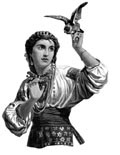
Scott Hahn’s Novelties
CONVERTS OR "HAHN-VERTS"?
Scott Hahn deserves much gratitude from the Catholic Church in the U.S. A theology pro-fessor at the Franciscan University of Steubenville, Hahn has an infectious enthusiasm for the Catholic faith and a passion for explaining it in ways that ordinary people can understand, via popular audiocassette series, books, newsletters, talks, and appearances on Mother Angelica’s EWTN. Through his efforts, numerous Catholics have come to better understand and appreciate their faith, to develop deeper devotional lives, and to be more excited about being Catholic. Hahn’s enthusiasm for the faith and his clear, simple explanations of it are so powerful that even many non-Catholics have caught the vision and embraced the Catholic faith, leading to countless enthusiastic and dynamic converts.
All this is wonderful. It is cause for praising God and saying a sincere thank you to Hahn for his co-operation with God’s grace. At the same time, there is always room for growth, even for the most experienced presenter of the faith. In Hahn’s case there are factors that hamper him from presenting the faith even better — factors that are cause for concern. These concerns are magnified when one considers that Hahn may be the best-selling author of Catholic theological works in the U.S. Hundreds of thousands of his books have been sold, and their readership consists largely of laymen. Hundreds of thousands of his audiocassettes also have been sold, and tens of thousands watch him regularly on EWTN. When Hahn speaks, laymen listen. Some listen and absorb his ideas so thoroughly that they have begun to call themselves “Hahn-verts.”
Abbreviations for works by Scott Hahn:
RSH: Rome Sweet Home (with Kimberly Hahn);
FCL: First Comes Love;
FKP: A Father Who Keeps His Promises
Hahn the Intrepid
Hahn is a convert from Presbyterianism, and from an unusual theological wing or school within Presbyterianism: theonomy, a school that places much greater emphasis on Old Testament law than is common among most Protestants. As a Presbyterian, Hahn was a pastor of a theonomic church (Trinity Presbyterian Church in Fairfax, Va.) and Assistant Professor at a theonomic school (Dominion Theological Institute in Washington, D.C.).
Even within conservative Presbyterianism, theonomy is an uncommon movement, and its adherents are often very much aware of going against the flow. In part because of this, theonomists tend to be theologically intrepid and adventurous, willing to explore ideas that may seem unusual to their peers. The thrill of theological discovery, and the exhilaration of sharing new insights and ideas with one’s fellows, runs strong in theonomist circles. Such open-mindedness can be a good thing; at its best, it can help one to rise above the preconceptions and cultural limitations common in one’s own circle, and to face up to difficulties within one’s worldview commonly glossed over by one’s peers.
Indeed, in Hahn’s case, there can be little doubt that such theological intrepidness was a factor in his conversion to Catholicism, that it helped him to face up to the difficulties inherent in sola scriptura and sola fide, and explore the case for such Catholic distinctives as sacred tradition, magisterial authority, and sacramental and liturgical worship. In his conversion stories Hahn has related how, as a Presbyterian pastor, he was eager to share his “discoveries” about sacramental and liturgical worship with his congregation, who received these with enthusiasm (RSH, p. 44).
Insofar as Hahn’s open-mindedness and enthusiasm for discovery has led him to explore and finally embrace the certitudes of the Catholic faith, it has served him well. However, Hahn’s enthusiasm for theological discovery has also led him, as a Catholic, to advocate ideas that are not so solidly rooted in Catholic tradition. Some of these ideas, in fact, are common in the theonomic Presbyterian circles from which he converted. Others would seem surprising or unusual in almost any circle, and they suggest an ongoing desire not merely to champion what is commonly accepted among orthodox Catholics, but to push the envelope theologically. While many of Hahn’s distinctive ideas fall more or less within the range of opinion permitted in Catholic thought, some, as this article will show, seem very dubious indeed, and a few are of the sort that, in a prior age, might have incurred such censures as “offensive to pious ears,” “suspect,” “rash,” or “proximate to heresy.”
You May Also Enjoy
Dawkins's language, his volleys of abuse, his scorn for most of the human race shows how madly he must defend his esoteric faith.
Can a mother forget her infant, be without tenderness for the child of her womb?
…A conference addressing the problems facing People of Height deserves attention and ought to draw a national audience.

